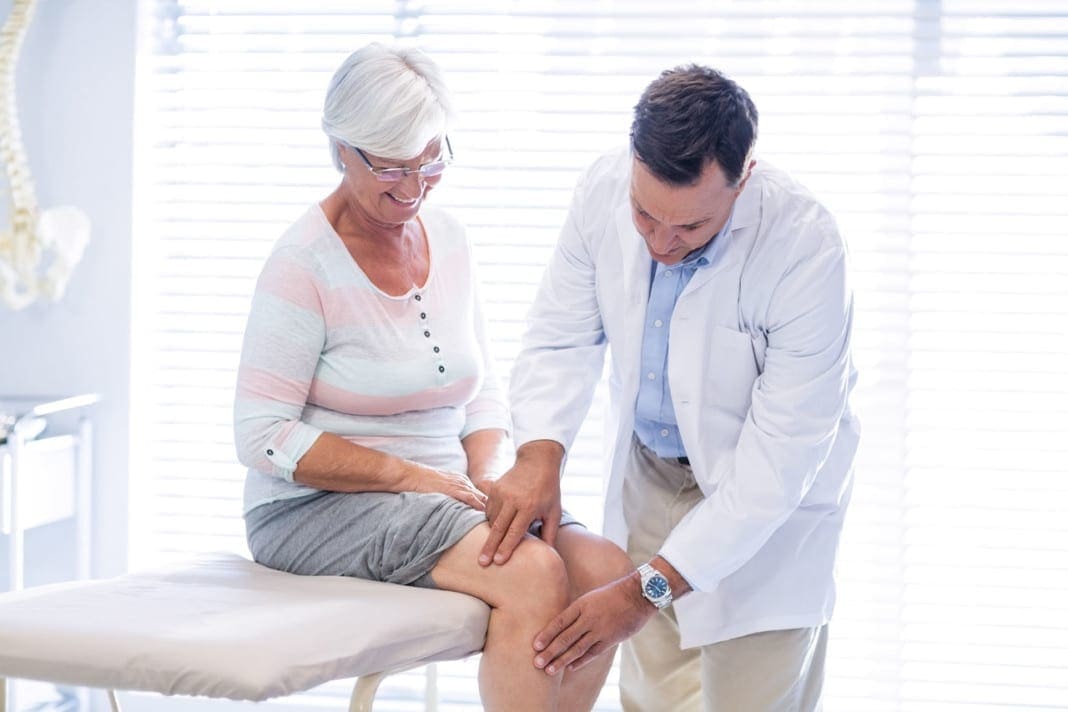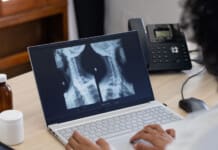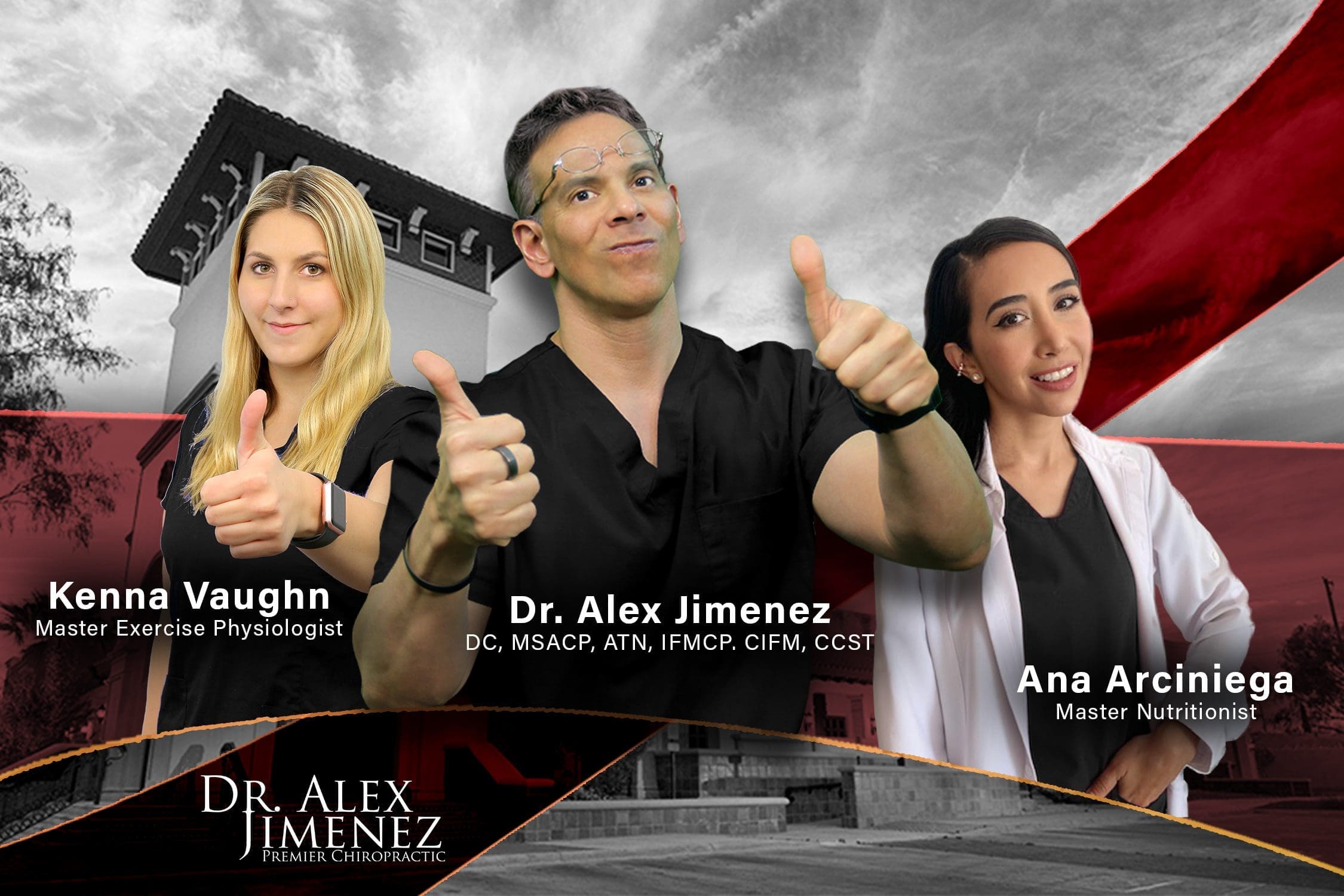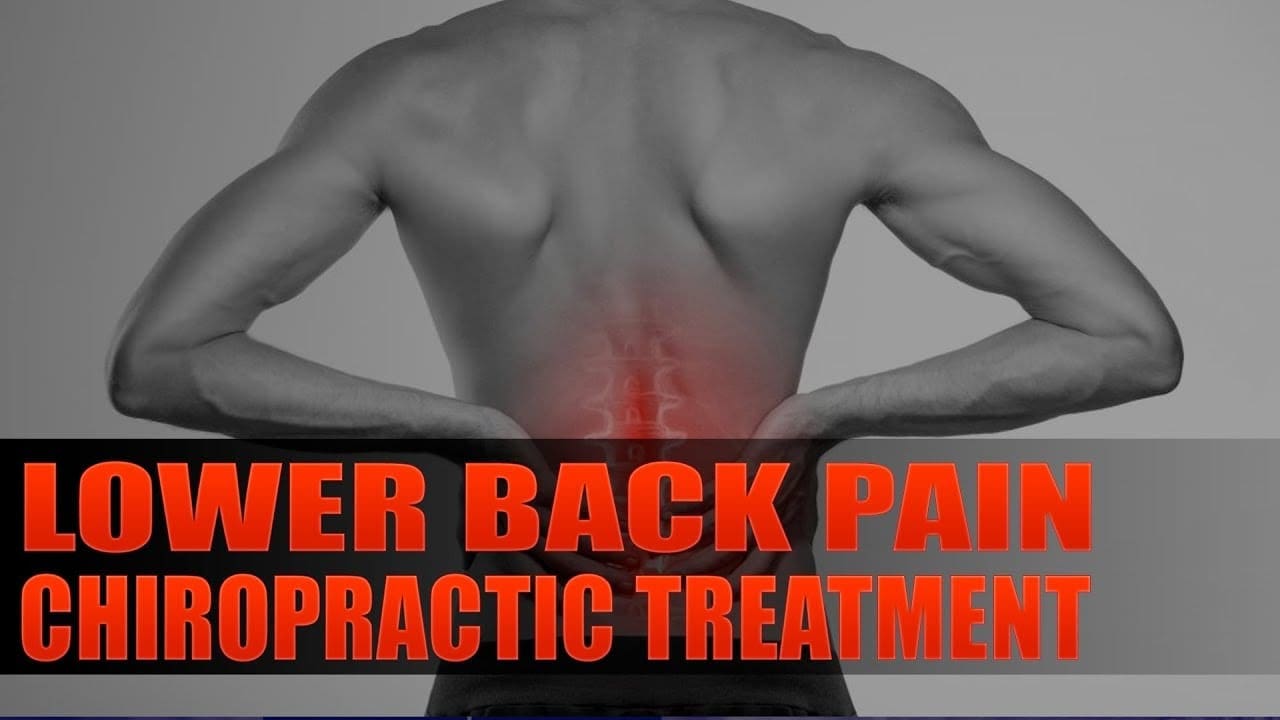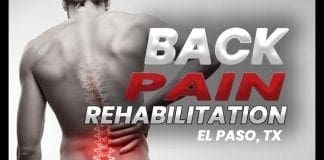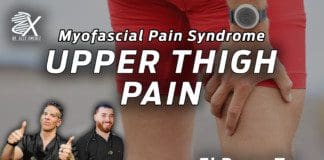Chiropractors don’t only work on the spine. Doctors of chiropractic are trained to treat the entire musculoskeletal system. They could be called joint specialists. Chiropractic physical therapy can help with knee pain. They can help bring knee pain relief in several ways by treating the root cause/s. A chiropractor will perform:
- Knee adjustments
- Hip adjustments
- Posture analysis
- Gait analysis
- Weight distribution analysis
There are also a number of chiropractic physical therapy modalities to help with pain, swelling, and arthritis. Knee pain causes can vary. A chiropractor can determine the underlying cause, relieve the pain, and help prevent future injury.
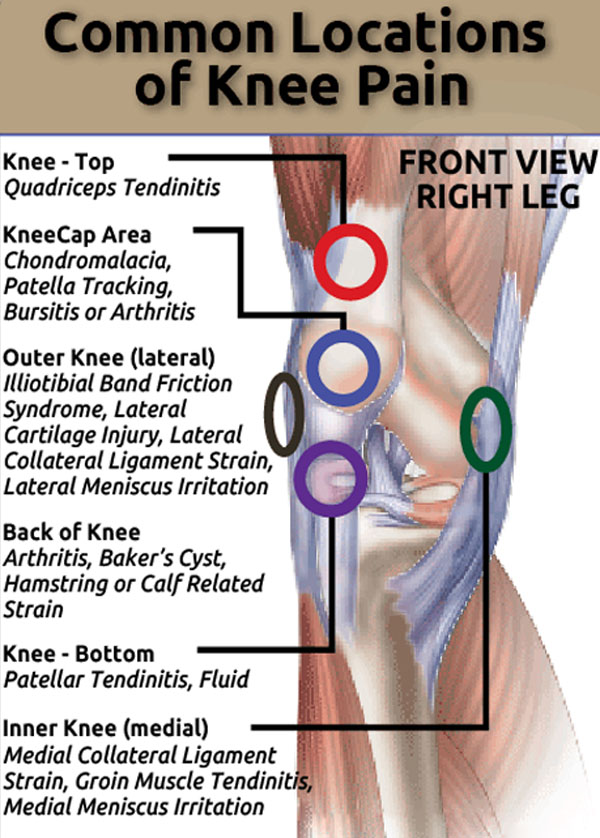
Table of Contents
Chiropractic and The Body’s Musculoskeletal System
Many think that treating knee pain comes down to surgery or painkillers. Surgery can be the best option for some, but it is always best to exhaust conservative treatments, which chiropractic physical therapy is one of the most effective. Pain medication can be appropriate but with the addictive potential about they are best avoided unless absolutely necessary. Chiropractic offers an alternative to pain medications and even surgery for certain cases.
Causes For Common Knee Pain Issues
Here are some of the most common causes of knee pain along with the ways a chiropractor can help to relieve the pain and treat the underlying issue. Treatment plans vary depending on the specific circumstances/conditions.
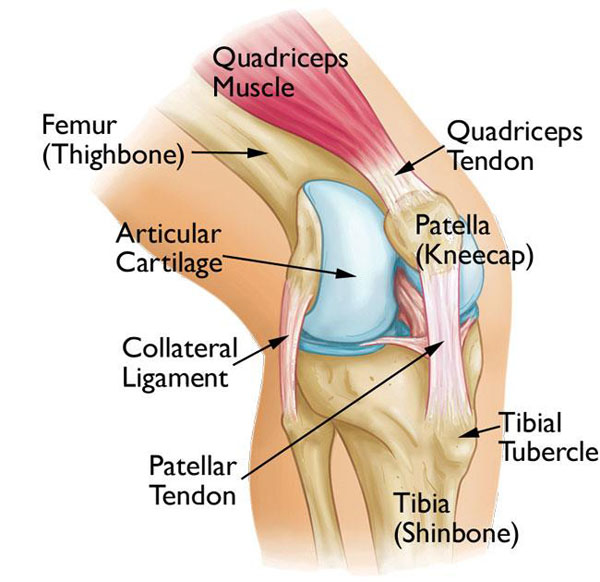
Knee Bursitis
Bursitis is inflammation of the fluid-filled sac located in the joints between bones, tendons, and muscles. The sacs are called bursae and are essential in proper joint function. They help reduce friction during the course of regular joint movement/function. Knee bursitis is commonly caused by overuse and misalignment. It can be caused while:
- Walking
- Running
- Kneeling
- Stretching the knee
- It can also cause swelling around the front of the kneecap
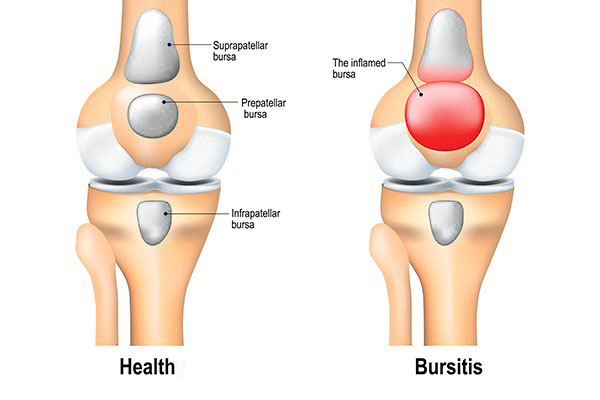
Chiropractic Treatment
The reduction of pain and swelling are the first steps of chiropractic physical therapy. This is achieved with:
- Therapeutic massage
- Ultrasound
- Hot and cold therapy
- Cold laser therapy
Once the pain and swelling are addressed then the cause of the inflamed bursa can be determined. This is done through adjustments of the knee, hips, or spine to help correct the issue and promote proper recovery and prevention.
Patellar Tendonitis
Tendonitis means there is damage or irritation to a tendon. Patellar tendonitis occurs in the tendon that connects the kneecap to the shin. This is common for individuals who run and jump regularly like athletes. Overweight individuals have an increased risk for patellar tendonitis because of the extra stress placed on the knees. This is often a result of repeated overuse and happens gradually. It can be the result of trauma to the knee as well. The pain happens just below the kneecap and increases with physical activity.
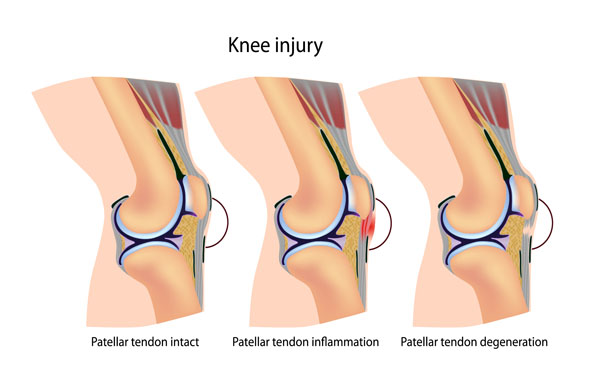
Chiropractic Treatment
Most often rest is the first option. Chiropractic physical therapy can recommend wearing a knee brace during the treatment. They will also teach the patient proper stretching and warm-up exercises to prevent tendonitis.
Osteoarthritis
Chiropractic is effective at reducing arthritis pain and inflammation throughout the body. Osteoarthritis can make everyday activities like walking and kneeling difficult or impossible. Chiropractic is designed to help reduce pain increase blood/nerve circulation that will promote healthy joint function and movement.
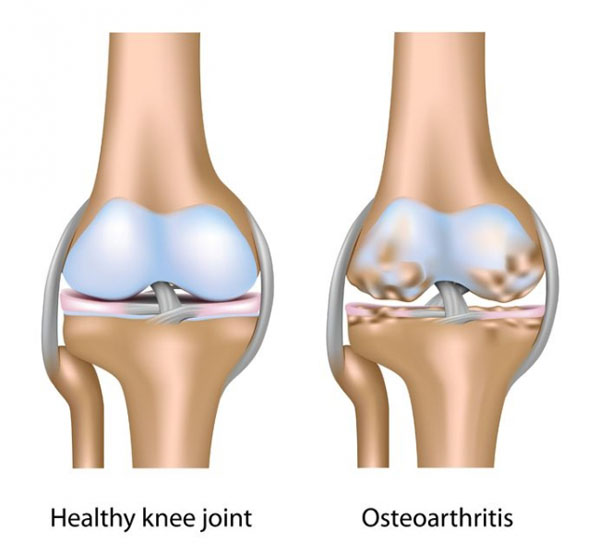
Chiropractic Treatment
Chiropractic will help osteoarthritis through:
- Massage
- Ultrasound
- Laser therapy
- All can help reduce pain and inflammation in the knees joints
- Hands-on stretching
- Adjustments can also help to improve the range of motion and joint function
This is important because knee pain can lead to increased pressure on the joints in the lower back, causing discomfort/pain as well.
Knee Valgus
Knee valgus also known as knock knee, is an inward tilt of the knees. It is easy to see when squatting or kneeling, but it can also happen when walking or standing. Young children tend to develop knee valgus but grow out of it by the time they are 10 years of age. However, if the knees remain bowed into the teenage years and beyond, it can cause issues in the hips, glutes, and back. Knee valgus can also be the result of:
- Weak muscles in the legs, hips, or glutes
- Tight muscles in the legs, hips, or glutes
- Determining the exact cause is essential to address it and develop a treatment plan to correct the issue.
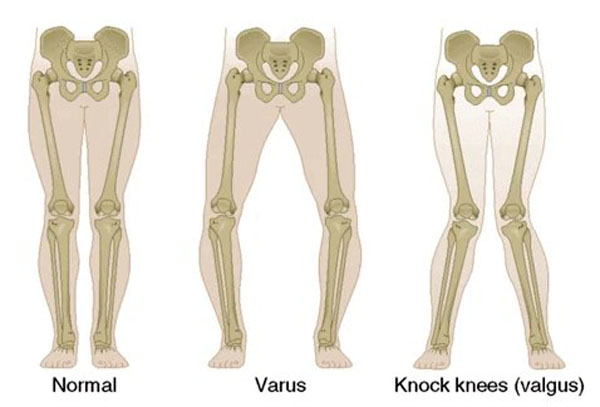
Chiropractic Treatment
Chiropractic specializes in the musculoskeletal system and a doctor of chiropractic knows what to look for. A chiropractor can address the issue through adjustments of the spine, hips, and knees. Hands-on clinic exercises and at-home exercises will be incorporated to correct the issues. These exercises combined with chiropractic will address structural and postural issues.
Other Knee Pain Causes
Chiropractic can also address and recommend treatments for other knee conditions. These include:
- Referred pain
- Meniscus damage
- Iliotibial band syndrome
- Osgood-Schlatter disease

Chiropractic Adjustments for Pain Relief, Function, and Prevention
Problems with the hips and spine can contribute to knee pain, as well as issues with the foot, ankle, or pelvis. Chiropractors perform a thorough examination of all the joints, tendons, and muscles that could be contributing to the pain. They will look at a full medical history and other details like:
- Overall health
- Diet
- Lifestyle habits
- Job
- Exercise and/or sports activities
- Injuries
- Posture
- Walking gait
With this information, the chiropractor will develop a customized plan unique to the individual’s needs and situation. Waiting for the pain to go away is not the best option. Chiropractic is safe, non-invasive, and offers a thorough approach to treating knee pain.
Body Composition Testimonial
Difficulty Moving
Lack of adequate muscle can cause difficulty moving like taking the elevator becoming a necessity, getting tired more easily, and getting in and out of a car can become a challenge. These are all possible experiences that can come as a result of losing muscle. Around 19% of women and 10% of men aged 65 years or older are unable to kneel. With no balance to kneel and pick something up means trouble. What to do to prevent massive muscle loss.
- Getting the proper amount of protein intake throughout the day spread out across meals rather than all at once.
- Monitor body composition regularly, which will make sure muscle mass loss is minimized.
- Begin a strength-training regimen.
Dr. Alex Jimenez’s Blog Post Disclaimer
The scope of our information is limited to chiropractic, musculoskeletal, physical medicines, wellness, and sensitive health issues and/or functional medicine articles, topics, and discussions. We use functional health & wellness protocols to treat and support care for injuries or disorders of the musculoskeletal system. Our posts, topics, subjects, and insights cover clinical matters, issues, and topics that relate and support directly or indirectly our clinical scope of practice.*
Our office has made a reasonable attempt to provide supportive citations and has identified the relevant research study or studies supporting our posts. We also make copies of supporting research studies available to the board and or the public upon request. We understand that we cover matters that require an additional explanation as to how it may assist in a particular care plan or treatment protocol; therefore, to further discuss the subject matter above, please feel free to ask Dr. Alex Jimenez or contact us at 915-850-0900. The provider(s) Licensed in Texas& New Mexico*
References
Hott, Alexandra et al. “Effectiveness of Isolated Hip Exercise, Knee Exercise, or Free Physical Activity for Patellofemoral Pain: A Randomized Controlled Trial.” The American journal of sports medicine vol. 47,6 (2019): 1312-1322. doi:10.1177/0363546519830644
Bhagat, Madhura et al. “Immediate effects of Mulligan’s techniques on pain and functional mobility in individuals with knee osteoarthritis: A randomized control trial.” Physiotherapy research international: the journal for researchers and clinicians in physical therapy vol. 25,1 (2020): e1812. doi:10.1002/pri.1812
Professional Scope of Practice *
The information herein on "Chiropractic Physical Therapy For Knee Pain" is not intended to replace a one-on-one relationship with a qualified health care professional or licensed physician and is not medical advice. We encourage you to make healthcare decisions based on your research and partnership with a qualified healthcare professional.
Blog Information & Scope Discussions
Welcome to El Paso's Premier Wellness and Injury Care Clinic & Wellness Blog, where Dr. Alex Jimenez, DC, FNP-C, a Multi-State board-certified Family Practice Nurse Practitioner (FNP-BC) and Chiropractor (DC), presents insights on how our multidisciplinary team is dedicated to holistic healing and personalized care. Our practice aligns with evidence-based treatment protocols inspired by integrative medicine principles, similar to those found on this site and our family practice-based chiromed.com site, focusing on restoring health naturally for patients of all ages.
Our areas of multidisciplinary practice include Wellness & Nutrition, Chronic Pain, Personal Injury, Auto Accident Care, Work Injuries, Back Injury, Low Back Pain, Neck Pain, Migraine Headaches, Sports Injuries, Severe Sciatica, Scoliosis, Complex Herniated Discs, Fibromyalgia, Chronic Pain, Complex Injuries, Stress Management, Functional Medicine Treatments, and in-scope care protocols.
Our information scope is multidisciplinary, focusing on musculoskeletal and physical medicine, wellness, contributing etiological viscerosomatic disturbances within clinical presentations, associated somato-visceral reflex clinical dynamics, subluxation complexes, sensitive health issues, and functional medicine articles, topics, and discussions.
We provide and present clinical collaboration with specialists from various disciplines. Each specialist is governed by their professional scope of practice and their jurisdiction of licensure. We use functional health & wellness protocols to treat and support care for musculoskeletal injuries or disorders.
Our videos, posts, topics, and insights address clinical matters and issues that are directly or indirectly related to our clinical scope of practice.
Our office has made a reasonable effort to provide supportive citations and has identified relevant research studies that support our posts. We provide copies of supporting research studies upon request to regulatory boards and the public.
We understand that we cover matters that require an additional explanation of how they may assist in a particular care plan or treatment protocol; therefore, to discuss the subject matter above further, please feel free to ask Dr. Alex Jimenez, DC, APRN, FNP-BC, or contact us at 915-850-0900.
We are here to help you and your family.
Blessings
Dr. Alex Jimenez DC, MSACP, APRN, FNP-BC*, CCST, IFMCP, CFMP, ATN
email: coach@elpasofunctionalmedicine.com
Multidisciplinary Licensing & Board Certifications:
Licensed as a Doctor of Chiropractic (DC) in Texas & New Mexico*
Texas DC License #: TX5807, Verified: TX5807
New Mexico DC License #: NM-DC2182, Verified: NM-DC2182
Licensed as a Multi-State Advanced Practice Registered Nurse (APRN*) in Texas & Multistate
Multistate Compact RN License by Endorsement (42 States)
Texas APRN License #: 1191402, Verified: 1191402 *
Florida APRN License #: 11043890, Verified: APRN11043890 *
* Prescriptive Authority Authorized
ANCC FNP-BC: Board Certified Nurse Practitioner*
Compact Status: Multi-State License: Authorized to Practice in 40 States*
Graduate with Honors: ICHS: MSN-FNP (Family Nurse Practitioner Program)
Degree Granted. Master's in Family Practice MSN Diploma (Cum Laude)
Licenses and Board Certifications:
DC: Doctor of Chiropractic
APRNP: Advanced Practice Registered Nurse
FNP-BC: Family Practice Specialization (Multi-State Board Certified)
RN: Registered Nurse (Multi-State Compact License)
CFMP: Certified Functional Medicine Provider
MSN-FNP: Master of Science in Family Practice Medicine
MSACP: Master of Science in Advanced Clinical Practice
IFMCP: Institute of Functional Medicine
CCST: Certified Chiropractic Spinal Trauma
ATN: Advanced Translational Neutrogenomics
Memberships & Associations:
TCA: Texas Chiropractic Association: Member ID: 104311
AANP: American Association of Nurse Practitioners: Member ID: 2198960
ANA: American Nurse Association: Member ID: 06458222 (District TX01)
TNA: Texas Nurse Association: Member ID: 06458222
NPI: 1205907805
| Primary Taxonomy | Selected Taxonomy | State | License Number |
|---|---|---|---|
| No | 111N00000X - Chiropractor | NM | DC2182 |
| Yes | 111N00000X - Chiropractor | TX | DC5807 |
| Yes | 363LF0000X - Nurse Practitioner - Family | TX | 1191402 |
| Yes | 363LF0000X - Nurse Practitioner - Family | FL | 11043890 |
| Yes | 363LF0000X - Nurse Practitioner - Family | CO | C-APN.0105610-C-NP |
Dr. Alex Jimenez, DC, APRN, FNP-BC*, CFMP, IFMCP, ATN, CCST
My Digital Business Card

